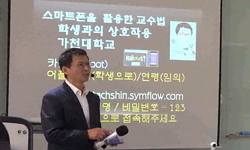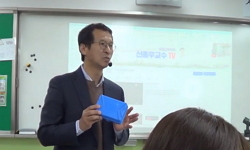본 연구는 보육기관의 질적 향상을 위해서는 보육교사의 긍정적 자아개념을 통한 교사-영유아 상호작용이 중요하다는 관점에서 보육교사의 자아개념과 교사-영유아 상호작용 요인 간의 관...
http://chineseinput.net/에서 pinyin(병음)방식으로 중국어를 변환할 수 있습니다.
변환된 중국어를 복사하여 사용하시면 됩니다.
- 中文 을 입력하시려면 zhongwen을 입력하시고 space를누르시면됩니다.
- 北京 을 입력하시려면 beijing을 입력하시고 space를 누르시면 됩니다.
보육교사의 자아개념과 교사-영유아 상호작용 요인 간의 관계 = The relationship between day care teacher's self-concept and teacher-infant interaction factors
한글로보기https://www.riss.kr/link?id=T14144945
- 저자
-
발행사항
서울 : 숭실대학교 교육대학원, 2016
-
학위논문사항
학위논문(석사) -- 숭실대학교 교육대학원 , 유아교육전공 , 2016. 8
-
발행연도
2016
-
작성언어
한국어
- 주제어
-
발행국(도시)
서울
-
형태사항
46 ; 26 cm
-
일반주기명
지도교수: 이경화
-
UCI식별코드
I804:11044-000002287191
- 소장기관
-
0
상세조회 -
0
다운로드
부가정보
국문 초록 (Abstract)
본 연구는 보육기관의 질적 향상을 위해서는 보육교사의 긍정적 자아개념을 통한 교사-영유아 상호작용이 중요하다는 관점에서 보육교사의 자아개념과 교사-영유아 상호작용 요인 간의 관계를 알아보는데 목적을 두었다.
본 연구의 대상은 서울, 인천 지역에 위치한 국공립과 민간어린이집 20개소에 재직 중인 보육교사 150명을 대상으로 하였으며 보육교사의 자아개념(이경화, 고진영, 2015)과 교사-영유아상호작용(이기숙, 이은해, 1996)을 측정하여 그 결과를 분석하였다. 수집된 자료에 대한 측정도구의 신뢰성을 위해 내적일치도 Cronbach's α를 산출하였으며, 보육교사의 자아개념과 교사-영유아 상호작용 간의 상관관계를 살펴보기 위해 Pearson의 상관계수를 산출하였다. 그리고 보육교사의 자아개념 수준에 따른 교사-영유아의 상호작용 차이를 알아보기 위해서는 자아개념 하위영역별로 평균(M)을 중심으로 ±1/2표준편차(SD)를 기준으로 상, 중, 하 세 집단으로 구분하여 ANOVA 분석을 실시하였다.
본 연구를 통해 나타난 결과는 다음과 같다.
첫째, 보육교사의 자아개념과 교사-영유아 상호작용 간의 상관관계에서는 인지적 자아를 제외한 모든 자아개념의 하위영역에서 교사-영유아 상호작용 간에는 정적인 상관관계를 보여 주었다.
둘째, 보육교사의 자아개념 수준별 교사-영유아 상호작용 요인의 차이에서는 정의적 자아와 신체적 자아 수준에 따른 교사-영유아 상호작용 모든 요인에서는 의미 있는 차이를 보였으나, 인지적, 사회적 수준에 따른 상호작용 요인에서는 의미가 없는 것으로 나타났다. 또한 집단 간의 점수를 비교해 보면 총 자아개념 점수가 가장 높은 상 집단이 교사-영유아 상호작용 총점과 모든 하위요인에서 가장 높은 점수를 보이고 있으며, 그 다음 중 집단, 하 집단 순으로 나타났다. 이것은 보육교사가 긍정적인 자아개념을 갖을수록 교육현장에서도 영유아에게 정서적, 언어적, 행동적으로 적극적인 상호작용을 하고 있다는 것을 의미한다.
연구결과를 통해 보육교사의 자아개념이 교사-영유아 상호작용에 관계가 있음을 확인 할 수 있었으며, 보육교사가 긍정적인 자아개념을 형성하여 영유아와 질 높은 상호작용이 이루어 질 수 있도록 보육교사에 대한 처우개선과 사회적 인식의 변화 및 보육교사의 전문성 향상을 위한 다양한 재교육이 이루어져야 할 것이다. 이러한 정서적, 물리적, 환경적 변화를 통해 보육교사의 직업에 대한 자긍심과 보람을 느낄 수 있다면 자연스럽게 교사 스스로에 대한 긍정적 자아개념도 높아져 교사-영유아 상호작용의 질적 수준도 향상 될 것이다.
다국어 초록 (Multilingual Abstract)
This study was aimed at finding out relationship between a day care teacher’s self-concept and teacher-infant interaction factors from a point of view that teacher-infant interaction was important throughout a teacher’s positive self-concept to im...
This study was aimed at finding out relationship between a day care teacher’s self-concept and teacher-infant interaction factors from a point of view that teacher-infant interaction was important throughout a teacher’s positive self-concept to improve quality of day care centers.
The study selected 150 day care teachers in 20 national and private day care centers in Seoul and Incheon, and the data were analyzed by measuring a teacher’s self-concept(Lee Kyung Hwa, Goh Jin Young, 2015) and teacher-infant interaction(Lee Gi Sook, Lee Eun Hae, 1996). For the credibility of the measurement tool, the study calculated internal consistency Cronbach's α, and Pearson’s correlation coefficient to see the relation between a teacher’s self-concept and teacher-infant interaction. To find out difference in teacher-infant interaction depending on the teacher’s self-concept level, the study classified sub factors of self-concept in three groups on the basis of ±1/2 SD from the average(M) and conducted ANOVA analysis.
The result of the study was as follows.
First, in correlation between a teacher’s self-concept and teacher-infant interaction, all sub factors of self-concept except for cognitive self showed positive relation in teacher-infant interaction.
Second, in difference in teacher-infant interaction depending on a teacher’s self-concept level, teacher-infant interaction factors depending on definitive self and physical self level showed significant difference, there was no difference in cognitive and social level interaction factors. Moreover, in comparison of group scores, the highest group with the highest self-concept score showed the highest score in all sub factors and the total score of teacher-infant interaction followed by the middle group and the lowest group. It means that the more positive self-concept a teacher has, the more positive interaction with the infant is made in terms of emotion, language and behavior in the educational field.
The result showed that a teacher’s self-concept was related to teacher-infant interaction, and the more positive self-concept a teacher formed, the higher quality of interaction with infants was made that requires providing better work condition for teachers, changes in social perception and re-education to improve the teacher’s professionalism. If a teacher can feel rewarding and pride in their job through the emotional, physical and environmental changes, it will naturally increase the teacher’s positive self-concept that leads to improvement of quality of teacher-infant interaction.
목차 (Table of Contents)
- 목 차
- 국문초록 ⅴ
- ABSTRACT ⅶ
- 목 차
- 국문초록 ⅴ
- ABSTRACT ⅶ
- Ⅰ. 서론 1
- 1. 연구의 필요성 및 목적 1
- 2. 연구문제 4
- Ⅱ. 이론적 배경 5
- 1. 자아개념의 정의와 보육교사의 자아개념 5
- 1) 자아개념의 정의 5
- 2) 자아개념의 특성 및 발달과 구조 7
- 3) 보육교사의 자아개념의 중요성 11
- 2. 교사-유아 상호작용의 특성과 중요성 13
- 1) 교사-유아 상호작용의 개념 및 특성 13
- 2) 교사-유아 상호작용의 중요성 18
- Ⅲ. 연구방법 21
- 1. 연구대상 21
- 2. 측정도구 22
- 3. 자료처리 25
- Ⅳ. 연구결과 및 해석 27
- 1. 보육교사의 자아개념과 교사-영유아 상호작용 간의 상관관계 27
- 2. 보육교사의 자아개념 수준에 따른 교사-영유아 상호작용 요인의 차이 28
- Ⅴ. 논의 및 결론 37
- 1. 논의 37
- 2. 결론 39
- 참고문헌 41












